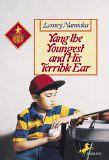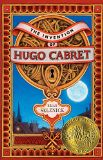Such a weird week. Having Monday and Tuesday off totally throws off my internal clock, especially because it's my week to work Saturday, which means I also have tomorrow off. Next week will be back to normal, but the week after that sees me taking time off to hang out with visiting friends, so it'll be the same as this week. CRAZY TOWN.
Anyway, one of my goals for January was to review books that I read in 2007 but hadn't reviewed yet.
So, without further ado, here are some old reviews!
Yang the Youngest and his Terrible Ear Lensey Namioka
Yingtao Yang is the youngest of 4. His family just moved to Seattle from China and they are slowly getting used to their new country. It was hard at first, but things are settling down, even if his sister has done something utterly bizarre and taken an American name while at school.
The real problems aren't cultural. The real problem is that Yingtao is totally tone deaf and, no matter how hard he tries, is really bad at violin. Too bad his parents are musicians and all of his older siblings play beautifully. He's supposed to be the 4th in their quartet, but he's just no good! His parents say it's because he doesn't practice enough and yell at him for wasting his time playing baseball, which he is really good at.
But, his new friend has the opposite problem--his parents want him to be good at baseball and spend all his time playing the game, but he's horrible and really just wants to spend all his time playing violin, which he loves. So, with the big recital, Yingtao will just pretend to play and his friend will really play behind a curtain. What could possibly go wrong?
This is a funny book about fitting in, getting along with your parents, and playing baseball. I enjoyed the small glimpses into the issues of fitting into a new culture without that being what the story was all about. This is an older book, a classic even, and there's a reason why it's lasted so long. Kids will still enjoy it!
Good for boys 4-6th grade.
The Invention of Hugo Cabret Brian Selznick
Ok, so I'm not sure I can really add anything that hasn't been said before about dear Hugo. For those who don't know...
Hugo Cabret is a boy who lives in a Parisian train station and winds and fixes the clocks. He is obsessed with automatons.
The main beauty of this book is that it's part chapter book, part wordless picture book, with the segments of story told purely in pictures having the quality of a silent film, without resorting to flipbook.
It also was amazing last year when it one the Caldecott Awards (best Illustrated book) even though it clocks in at 533 pages. And, in addition to winning an award that is for picture books, it was also named one of the Top Ten Books for Teens.
CRAZY.
I loved it.
And rumor has it the Martin Scorcese has bought the rights. If anyone could do this book justice, he can.
Back for Weekly Geeks 12, some people asked me some questions about this one:
Bart's Bookshelf asked:
What you thought of the mix of prose and artwork in Hugo Cabret?
LOVE! I think for the subject matter of this story, with its look at early technology and film history, it worked really really well, more than just prose or just pictures would have.
Kim asked:
I have a question about The Invention of Hugo Cabret...What is this book about basically? Is this considered a young adult book? I have a 12 year old who really likes reading fantasy--Harry Potter, Brian Jacques, the Warrior series, etc...you get the picture! Would this book be up his alley. I am tired of buying him a book and having him be done in 2 days! This book looks like a pretty big tome which might take him 3 days to devour instead!!
While teens will really enjoy this, I would consider this middle grade. While this isn't fantasy, I think it might appeal to fantasy readers, especially if they enjoy the steampunk subgenre. However, given that large chunks, if not the majority of this book is told in pictures, it won't last 3 days. I think it took me 2 hours. I couldn't put it down. Then I turned it over and reread it again. Still, I do highly recommend it.
The most wonderful, beloved, and missed Dewey asked:
Did the visual art in The Invention of Hugo Cabret appeal to you? Do you think the images furthered the story as much as the text did?
It really appealed to me and I think in some cases it furthered the story even more than the text. Parts of the subject matter were highly visible and telling those parts of the story with a pictures instead of words just worked better, I think.
Michelle asked: It seemed like The Invention of Hugo Cabret was really big when it came out. I was working in a bookstore at the time that sold new books, and we couldn't keep it in stock. Very quickly, though, it crept into the shadows, and now it's hard even to ask someone about it, because no one has ever heard of it. Does the book give any insight into this - was it disappointing? Did it fail your expectations of it? Or did it just not stand out as much as it seemed like it would have?
Hmmm. This is a really interesting question, because it doesn't match my experience at all. I think part of the initial craziness over it was the fact that the format, mixing wordless picture book with chapter book, was so new. Then, when it won the Caldecott, it gained even more fame.
In my library, circulation has died down a bit on it, but it's still checked out on a regular basis. When we first got it , and then when it won, there was a mile long holds list. Even after that, it was rarely on the shelf--as soon as we got it in, it was gone again. Now, it does stay on the shelf once and a while, but still gets checked out a lot.
I think that while it does live up to the hype, it's more of a quiet book, not a runaway ohmygod everyone loves this sort of thing. If that makes any sense...



No comments:
Post a Comment